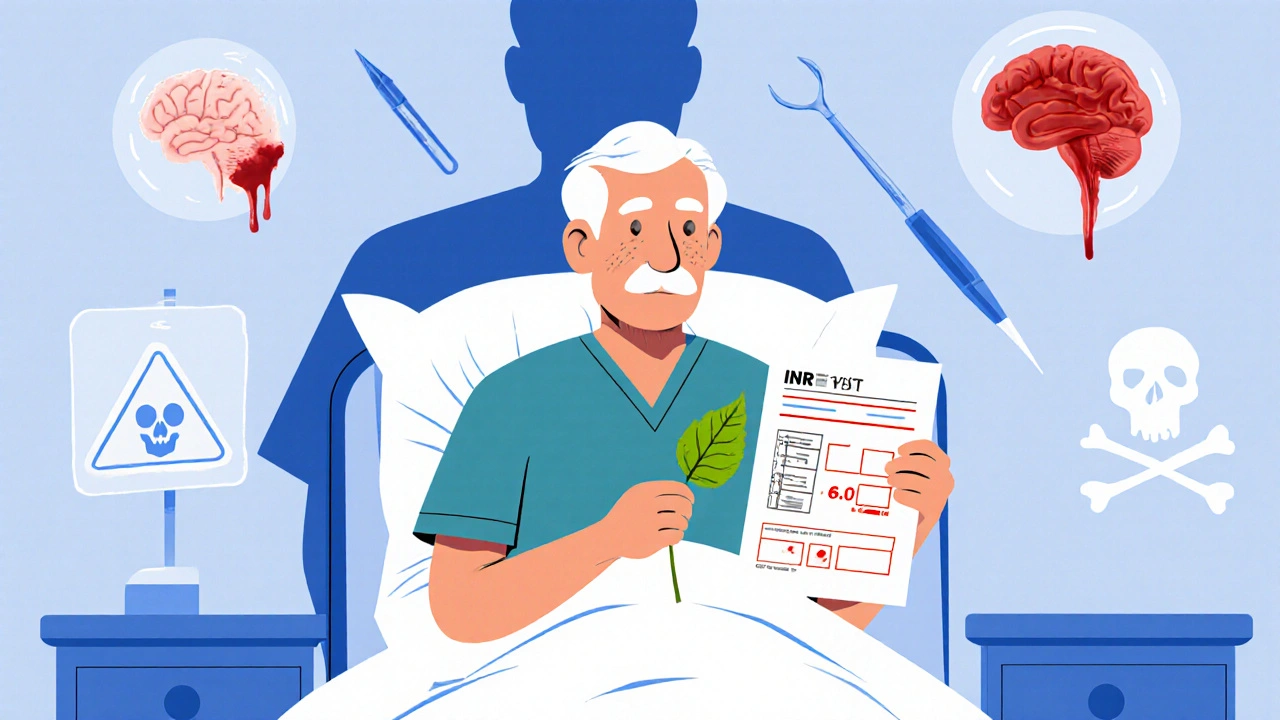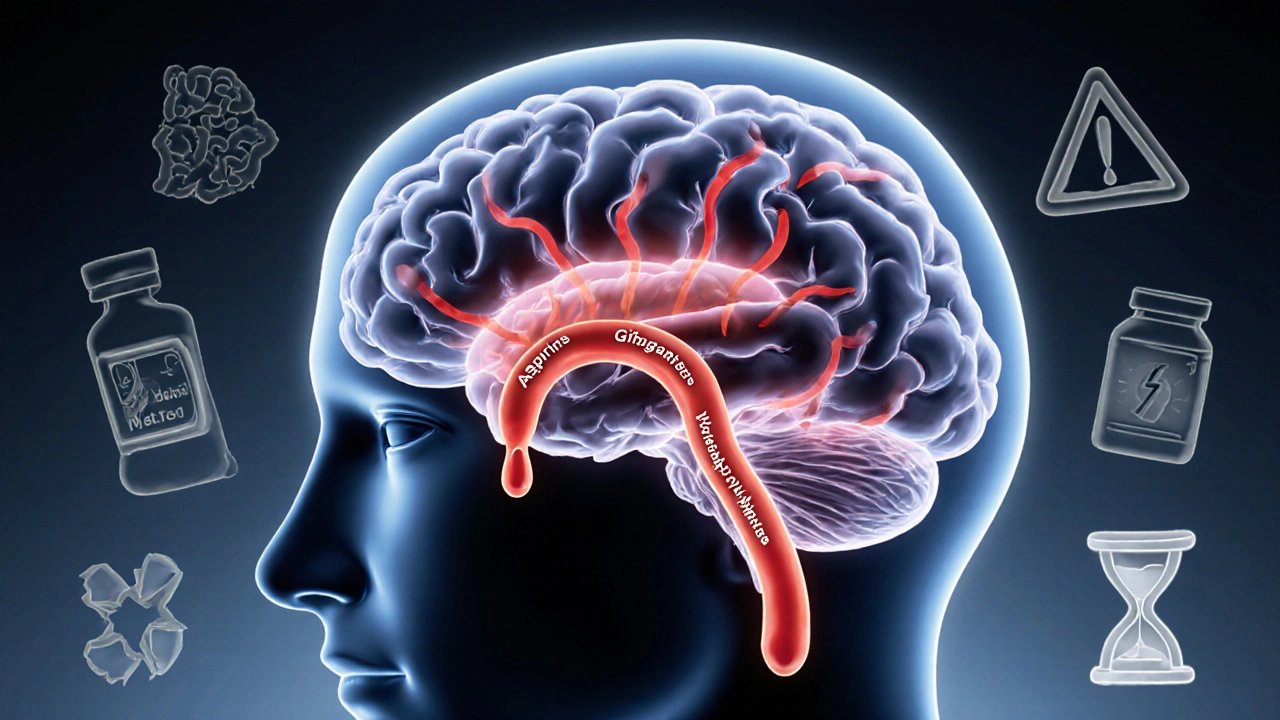Blood Thinners and Ginkgo Biloba Risk Calculator
This tool assesses your risk of bleeding when combining Ginkgo biloba with blood thinners. Based on documented medical cases, the calculator identifies dangerous combinations and provides critical safety guidance.
Results
If you’re taking a blood thinner like warfarin, aspirin, or clopidogrel, and you’re also using Ginkgo biloba for memory or circulation, you might be putting yourself at risk-without even knowing it. This isn’t theoretical. People have bled internally after combining the two. One man in his 60s developed spontaneous bleeding in his eye after just one week of taking Ginkgo biloba with low-dose aspirin. Another woman suffered a brain hemorrhage after years of daily Ginkgo use, with no other blood-thinning meds involved. These aren’t rare outliers. They’re documented cases.
What Ginkgo Biloba Actually Does to Your Blood
Ginkgo biloba comes from the leaves of an ancient tree native to China. It’s been sold for decades as a brain booster, but the science behind memory improvement is weak. What’s not weak is its effect on blood clotting. The active compounds in Ginkgo-flavonoid glycosides and terpene lactones-interfere with platelet aggregation. That means your blood cells have a harder time sticking together to form clots. This is exactly what blood thinners are designed to do. When you stack them together, you’re doubling down on the same mechanism.
Standard Ginkgo supplements contain 24% flavonoids and 6% terpenes, with typical doses between 120 and 240 mg per day. That’s the range used in most clinical studies. But here’s the catch: even at these "safe" doses, Ginkgo can push your body past its clotting limit when mixed with other meds.
Which Blood Thinners Are Most Dangerous to Mix With Ginkgo?
Not all blood thinners are created equal, and neither are their interactions with Ginkgo. Some combinations are far riskier than others.
- Warfarin (Coumadin, Jantoven): This is the most documented danger. Multiple case reports show Ginkgo causing spikes in INR levels-sometimes into dangerous territory above 6.0. Normal is 2.0 to 3.0 for most patients. An INR above 4.0 means your blood takes much longer to clot. At 6.0, even a minor bump can cause internal bleeding.
- Clopidogrel (Plavix): This antiplatelet drug is often prescribed after stents or heart attacks. Studies show Ginkgo significantly increases bleeding risk when taken with clopidogrel. One 2007 study in the British Journal of Clinical Pharmacology confirmed this interaction in healthy volunteers.
- Aspirin (80-325 mg): Even low-dose aspirin, taken daily for heart protection, becomes riskier with Ginkgo. The PLOS ONE 2023 study found a clear link between this combo and abnormal bleeding.
- NSAIDs like ibuprofen, naproxen, and celecoxib: These are common painkillers, but they also thin blood. Mixing them with Ginkgo is like pouring gasoline on a small fire.
- Ticagrelor and other newer antiplatelets: These are less studied, but case reports suggest caution is warranted.
Even medications you wouldn’t think are blood thinners can be risky. Omeprazole (Prilosec), used for acid reflux, and nifedipine (Procardia), for high blood pressure, have both been tied to abnormal coagulation tests when combined with Ginkgo. The NIH says this doesn’t always lead to bleeding-but it does mean your body’s clotting system is under strain.
The Contradictory Science: Why Experts Can’t Agree
You might have heard that Ginkgo doesn’t actually increase bleeding risk. That’s because some studies say it doesn’t. A 2023 trial tested EGb 761, a standardized Ginkgo extract, on 29 different blood clotting markers-and found no significant effect. So why do so many people bleed?
The answer lies in the difference between lab tests and real life. Lab studies look at controlled conditions. Real people take multiple drugs, have other health issues, and vary in metabolism. The PLOS ONE study found that while Ginkgo alone didn’t show strong effects in controlled settings, its interaction with other medications created a measurable spike in bleeding risk (OR: 1.08) and abnormal coagulation (OR: 1.49). The problem isn’t Ginkgo alone. It’s Ginkgo + other meds.
Also, not all supplements are equal. The FDA doesn’t regulate herbal products like prescription drugs. One bottle of Ginkgo might have 120 mg of active ingredients. Another might have 50 mg-or even contaminants. That inconsistency makes predicting interactions nearly impossible.

Who Should Never Take Ginkgo Biloba?
If you’re on any blood thinner, stop. That’s the safest rule. But even if you’re not, some people should avoid Ginkgo altogether.
- People with bleeding disorders-like hemophilia or von Willebrand disease.
- Older adults-their livers process drugs slower, so effects last longer.
- Pregnant women-Ginkgo may affect placental blood flow.
- People scheduled for surgery-even minor procedures like dental work or colonoscopies can become dangerous.
The American Society of Anesthesiologists says stop Ginkgo 2 to 3 weeks before surgery. That’s the gold standard. Some researchers argue 36 hours is enough based on how fast it clears the body. But why gamble? A single drop of internal bleeding during surgery can be fatal.
What About Other Supplements and Herbs?
Ginkgo isn’t the only herbal supplement that thins blood. Garlic, ginger, ginseng, and fish oil all have similar effects. If you’re taking one, you might be tempted to add another for "extra benefits." Don’t. The cumulative effect is unpredictable.
And it’s not just blood thinners. Ginkgo can interfere with antidepressants like fluoxetine (Prozac), diabetes meds like metformin, and even seizure drugs like phenytoin. It may reduce their effectiveness. It can also raise blood pressure if taken with decongestants like phenylephrine.
And don’t touch Ginkgo seeds. They’re toxic. Eating them-even roasted-can cause seizures, vomiting, and loss of consciousness. Stick to leaf extracts, and even then, proceed with caution.

What Should You Do If You’re Already Taking Both?
If you’re on a blood thinner and already taking Ginkgo biloba, don’t panic. But don’t ignore it either.
- Talk to your doctor or pharmacist. Bring your full list of supplements and meds. Many people forget to mention herbal products. They think it’s "natural," so it’s safe. It’s not.
- Get a blood test. If you’re on warfarin, ask for an INR check. If it’s higher than normal, Ginkgo could be the cause.
- Stop Ginkgo. If you’re planning surgery, stop it now. If you’re not, consider stopping anyway. The benefits for memory are unproven. The risks are real.
- Use a medication tracker. Apps or paper lists help you and your doctor see what you’re really taking. Don’t rely on memory.
Pharmacists are your best ally here. They see hundreds of drug interactions every week. They know which ones are dangerous and which ones are myths. Ask them. Don’t wait for your doctor to bring it up.
Bottom Line: Natural Doesn’t Mean Safe
Ginkgo biloba is marketed as a "natural" way to improve brain function. But "natural" doesn’t mean harmless. It’s a powerful plant extract with real, measurable effects on your blood. When mixed with prescription blood thinners, it can turn a routine day into a medical emergency.
The data isn’t perfect. Some studies say no risk. Others say yes. But the case reports are consistent. People bleed. Sometimes they die. And it’s preventable.
If you’re taking any anticoagulant or antiplatelet drug-whether it’s a prescription or over-the-counter like aspirin-avoid Ginkgo biloba. Period. There’s no safe dose when you’re already thinning your blood. The potential benefit? Unclear. The risk? Real. And it’s not worth it.
Can I take Ginkgo biloba if I’m on low-dose aspirin?
No. Even low-dose aspirin (80 mg) increases bleeding risk when combined with Ginkgo biloba. There are documented cases of eye bleeding and other hemorrhages in people taking this combination. The risk isn’t theoretical-it’s been seen in real patients. Stop Ginkgo if you’re on aspirin, even if it’s just for heart protection.
How long before surgery should I stop Ginkgo biloba?
The American Society of Anesthesiologists recommends stopping Ginkgo biloba 2 to 3 weeks before any elective surgery. This gives your body enough time to clear the compound and restore normal clotting function. Some studies suggest 36 hours may be enough, but that’s not enough of a safety margin. Always follow your surgeon’s advice-don’t guess.
Does Ginkgo biloba thin blood like warfarin?
Ginkgo biloba doesn’t work the same way as warfarin, but it has a similar outcome. Warfarin blocks vitamin K, which your liver needs to make clotting factors. Ginkgo inhibits platelets from sticking together. Both make it harder for your blood to clot. When taken together, they multiply the risk. You don’t need to be on warfarin for Ginkgo to be dangerous-it can cause bleeding on its own in susceptible people.
Are all Ginkgo biloba supplements the same?
No. The FDA doesn’t regulate herbal supplements like prescription drugs. One bottle might contain 24% flavonoids and 6% terpenes-the standard used in studies. Another might have half that, or even contaminants. That means the dose you’re getting is unpredictable. Even if you take the same brand every time, batches can vary. There’s no reliable way to know what’s in your supplement.
Can Ginkgo biloba cause bleeding without any other medications?
Yes. There are documented cases of serious bleeding-including brain hemorrhages-in people who took Ginkgo biloba daily for years with no other blood thinners. This suggests Ginkgo alone can impair clotting in some individuals, especially those with underlying health conditions or genetic factors that affect blood clotting. It’s rare, but it happens.
Is there a safe dose of Ginkgo biloba if I’m not on blood thinners?
The standard dose of 120-240 mg per day is generally considered safe for healthy adults without bleeding disorders. But "safe" doesn’t mean risk-free. Ginkgo can still interact with other meds, raise blood pressure with decongestants, or trigger seizures in people with epilepsy. If you’re not sure, talk to a healthcare provider before starting. And never take Ginkgo seeds-they’re poisonous.





November 2, 2025 AT 18:21 PM
So Ginkgo’s basically the herbal version of a sneaky knife in the back? I took it for ‘focus’ for months. No idea it was quietly turning my blood into water. Yikes.
November 3, 2025 AT 17:10 PM
My grandma took Ginkgo for years. Never had a problem. But she also never took aspirin or anything else. Context matters. Not everyone’s at risk.
November 3, 2025 AT 22:33 PM
THE PHARMA COMPANIES HATE THIS ONE SIMPLE TRICK! Ginkgo is natural, so they want you to believe it’s dangerous so you’ll buy their overpriced pills. They’re scared of plants because plants don’t need patents. You’re being manipulated.
November 4, 2025 AT 23:03 PM
OMG I KNEW IT!! 🤯 Ginkgo is totally a government mind control herb disguised as a brain booster! They put it in everything so you forget how to question authority. Also, I read on a blog that the FDA banned it in 1998 but covered it up. I’ve stopped everything. I’m now drinking only distilled water and lemon.
November 5, 2025 AT 08:32 AM
Big yikes on the Ginkgo + aspirin combo. I’ve been taking both for years. Time to chat with my doc. Better safe than sorry. Thanks for the wake-up call 🙌
November 7, 2025 AT 07:27 AM
It is both regrettable and alarming that individuals continue to self-administer unregulated botanical substances under the delusion that "natural" equates to "benign." This represents a profound failure of public health literacy. One must exercise intellectual discipline when engaging with pharmacological agents, regardless of their origin.
November 7, 2025 AT 21:58 PM
But… what if the real danger isn’t Ginkgo… but the fact that we’ve outsourced our health to pills and profit-driven medicine? What if the body could heal itself… if we just stopped poisoning it with synthetic chemicals and then tried to "balance" it with herbs? Is Ginkgo the villain… or are we the villains for thinking we need to fix nature with more intervention?
November 8, 2025 AT 21:20 PM
Same guy who told me turmeric cures cancer. Now Ginkgo is dangerous? Who do we trust? The FDA? The same people who approved opioids? I’m not touching anything anymore. Not even water.
November 10, 2025 AT 07:07 AM
It is a well-documented fact that Ginkgo biloba has no proven cognitive benefits, and yet, it remains one of the most popular supplements in the US. This is a clear indicator of mass gullibility. The fact that people ignore clinical evidence in favor of anecdotal testimonials is a societal failure. I have reported this post to the FDA for misinformation.
November 11, 2025 AT 13:40 PM
Oh, so now "natural" is a red flag? Next you’ll tell me that sunlight is dangerous because it caused sunburns in 1987. What’s next? Water? Oxygen? I’m starting to think the real risk is trusting people who think they know what’s safe better than your own body.
November 12, 2025 AT 10:01 AM
I had a friend who bled out after knee surgery because she didn’t stop her supplements. She was fine one day, in ICU the next. Don’t be her. Talk to your pharmacist. They’re not just the people who hand you pills-they’re your last line of defense. Seriously. Do it.
November 14, 2025 AT 01:05 AM
People like you who post this kind of content are part of the problem. You scare people into avoiding natural remedies so they’ll keep buying Big Pharma’s toxic, patent-protected drugs. You’re not helping. You’re profiting off fear.
November 15, 2025 AT 11:14 AM
It is interesting to observe that the Western medical establishment, having long dismissed Ayurveda and Traditional Chinese Medicine, now selectively validates certain botanical interactions only when they align with pharmaceutical interests. Ginkgo, a tree revered for millennia, is now demonized because it cannot be patented. The irony is palpable.
November 16, 2025 AT 23:43 PM
Just talked to my pharmacist. Said even if I’m not on blood thinners, if I’m over 65 and taking anything for blood pressure, Ginkgo’s a no-go. She gave me a printed handout. I’m not taking any chances anymore. Good call, OP.